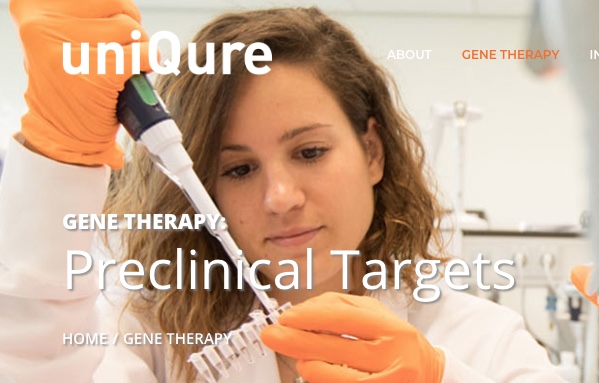By close I mean within a decade. Especially if you have SCA3 which is already in the pipeline for treatment.
First the cliff notes version:
A company in the Netherlands is moving towards a human clinical trial of a technology that could actually CURE many genetic SCAs with a one time injection into the brain:
uniqure.com/gene-therapy/hu...
uniqure.com/gene-therapy/ca...
Then a lengthier discussion:
In 2013 when I first learned I had the SCA1 mutation, I contacted Dr. Beverly Davidson and she said to me "there is real momentum" in her research. I kept in contact for the first 3 years, but then I became discouraged when it seemed to me her research in primates simply hadn't been moving forward to clinical trials as she had indicated. Well now it turns out her team in Philadelphia was not the only one researching this avenue, and now a company in the Netherlands is actually moving to human clinical trials of a gene therapy that would be a one time procedure that has the potential to actually CURE polyQ disorders by "silencing" the errant gene. The formal name for this technology is Adeno Associated Viral Vector. The company is called UniQure, and they are moving towards a first ever human clinical trial of an AAV treatment for a polyQ disorder, Huntington's Disease. What is key to understand here is that Huntington's disease is just one of a group of diseases called Polyglutamine Disorders, all of which stem from a genetic mutation that causes the body to produce a toxic protein. What's more this technology is best suited for a disease where the toxic protein is toxic because it has a "gain of function" meaning it's NOT toxic as a result of failing to do a job, but because it has BECOME toxic. This is important because this technology turns the gene off and stops the production of the protein so if the body NEEDS the protein then that could be a problem, but at least in the case of SCA1 the latest research shows the mutant protein to have just such a cause of toxicity: scasource.net/2018/09/24/dy...
Now the downside: What remains to be seen in the human trials is whether or not this technology will have any adverse effects. The good news is that there is already proof in humans in other studies that gene silencing can be effective with minimal side effects. Also this technology can not reverse damage already done. So for people already suffering with debilitating symptoms this technology, sadly, can not make one better. What is hoped, is that it will stop progression or onset. The final downside is pricing. Novartis has a similar treatment for a neurodegenerative disease called SMA, and they are charging $2.1 million for the single treatment which wouldn't include the medical charge of administering the drug. Hopefully, as the technology gains more applications the price will fall dramatically.
So, Stanleyclan, if you are reading this I would say your children have just gotten real hope that they will never have to fear SCA3.
Cheers!
Joe
EDIT:
" Polyglutamine-expansion disease family encompasses at least nine heritable disorders, including Huntington disease (HD) and the spinocerebellar ataxias SCA1, SCA2, SCA3, SCA6, SCA7 and SCA17."
EDIT:
My alternative therapy for SCA1 - healthunlocked.com/ataxia-u...
My other posts on Health Unlocked - healthunlocked.com/user/sunvox
